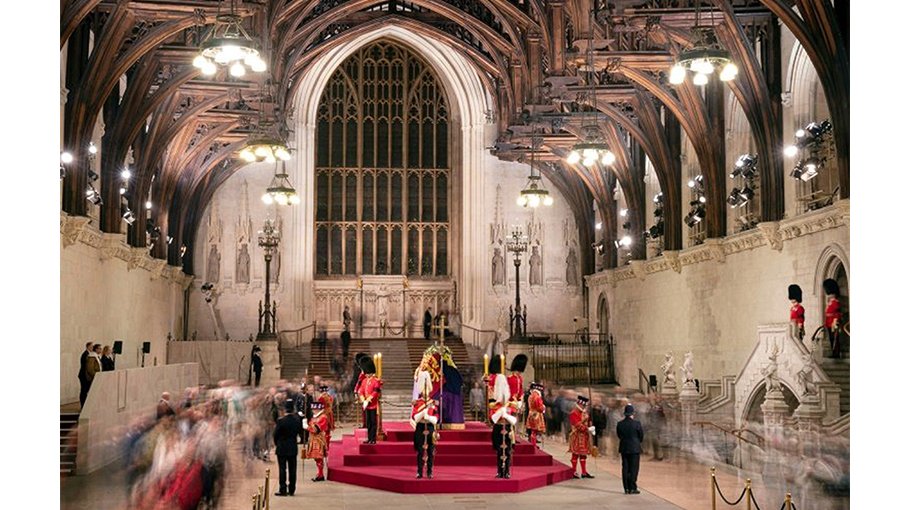Goodbye to the queen: bows, curtsies, even a wave

As each mourner reaches the exit after paying their respects to the coffin of Queen Elizabeth II, almost nobody can resist taking one last, fleeting look back. One even waved.
Final farewells to a much-loved monarch take place in the sombre yet majestic scene inside parliament's thousand-year-old Westminster Hall where she currently lies in state.
Mounted on a catafalque, her casket -- covered by the Royal Standard flag and adorned with the Imperial State Crown, her ceremonial Orb and Sceptre -- immediately commands the attention of everyone inside the high vaulted hall.
The stream of humanity -- spanning all ages, races and backgrounds -- has flowed unrelentingly hour after hour since 5:00 pm (1600 GMT) on Wednesday.
As dawn broke Friday those who had endured overnight queues, wrapped in jackets and hats to fend off the autumn chill, finally got their chance to spend a few seconds before the coffin containing Britain's longest reigning monarch.
Some dressed up for the sombre occasion, in suits or black, while others stuck to everyday attire.
Even those on crutches were undeterred by waits of up to 10 hours.
Once inside the hall, which once hosted the trials of the man who tried to blow up parliament, Guy Fawkes, in 1606 and King Charles I in 1649, the line divides into four separate streams.
Amid the dignified silence pervading the cavernous space -- with just muffled sounds of the early morning outside filtering in -- an array of small, poignant performances plays out as people reach the four-step podium and the sovereign's coffin.
A middle-aged woman bows. Another attempts a full curtsey. Men wearing old- fashioned hats remove them. Many make the sign of the cross.
Military veterans with their medals on display stand proud for several seconds.
For a few, the moment is simply too overwhelming, and the tears begin to flow.
Some comfort each other as they head for the exit, holding hands or linking arms.
One thing missing: people using their phones to take selfies and other photos. All electronics are banned.
At one point, a small white assistance dog emerges from the disability access entrance, pulling on its lead held by a young girl.
Tail wagging excitedly, it is wholly unaware of the magnitude of the setting, instead intent on sniffing the beige carpet laid out as a path for mourners to follow.
Every 20 minutes, the silence and current of people is interrupted by a changing of the guards, drawn from three different ceremonial units that form the monarch's bodyguard.
With two heavy taps of a rod, a guard signals it is time for 10 new Gentlemen at Arms, Yeomen of the Guard and members of the Royal Company of Archers to emerge from steps in the northwest corner, bringing the line to a temporary standstill.
As they march in clunking lockstep on the ancient stone floor to replace their colleagues standing vigil, the crowds appear transfixed by the centuries-old pageantry.
The more senior Gentlemen at Arms are decked out in helmets with white swan feather plumes and skirted red coats with garter blue velvet cuffs.
The colourfully dressed Yeomen of the Guard wear their signature cross belts
from the left shoulder, distinguishing them from their counterparts -- the Yeomen Warders or "Beefeaters" -- who guard the Crown Jewels at the Tower of London.
Before long, they are all in place once again, alongside white-gloved police officers and silence returns.
A couple of attendants remove and collect wax that has dripped onto the holders used to house four tall, flickering candles posted on each corner of the podium. Then the flow of mourners resumes.


